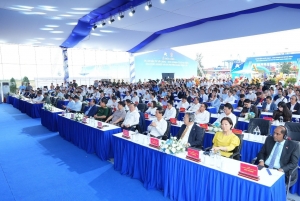Impetus set for a new journey in Vietnam’s logistics sector
 |
| Le Duy Hiep, Chairman, Vietnam Logistics Business Association |
One of the highlights is the development of logistics infrastructure. Seaport infrastructure has been strongly developed, with Cai Mep-Thi Vai deepwater seaports and Lach Huyen seaport enabling direct goods transportation directly from Vietnam to Europe and America. They include seaports in joint ventures with foreign-invested enterprises.
In shipping, there are many joint ventures, such as Vietfracht Vietnam with Neptune Orient Line Singapore, and Vinalines Vietnam with CGM of France. This development investment is important because more than 90 per cent of imported and exported goods of Vietnam are shipped through seaports.
Investment in road development, especially expressways, has also helped facilitate transportation and develop multimodal transport. The northern province of Quang Ninh takes the lead in attracting private funding in the development of seaports, highways, and airports.
Besides that, there are investments in the development of warehouses and means of transport, and logistics service centres. Vietnam’s T&T Group and Singapore’s YCH Group have jointly worked on a project to develop an inland container depot logistics centre in northern Vinh Phuc province, for example.
At present, Vietnamese logistics enterprises have gradually mastered in the technology of management. Many businesses have strong financial capacity to invest in modern logistics infrastructure by themselves. Therefore, the state needs to have encouraging policies to improve the competitiveness of Vietnamese logistics enterprises. We should only selectively encourage foreign-invested projects in the high-tech logistics sector.
Development journey
The logistics service industry has developed since the 1970s from forwarding and transportation services, and has now entered the development stage. According to the 2018 World Bank Report, Vietnam’s Logistics Performance Index ranked 39/160 and ranked third among ASEAN countries after Singapore and Thailand.
Around this time, the contribution of logistics services to the country’s GDP was about 4-5 per cent, with the growth rate of 12-14 per cent. The rate of outsourcing logistics services reached 60-70 per cent; and related costs are equivalent to about 16-17 per cent of GDP. The logistics service industry plays an increasingly important role in the country’s socioeconomic development, and is supported by the Party and state for its development, and is getting more interest from the business community.
In the development of the logistics service industry, domestic and foreign investment have made important contributions to the development of infrastructure, especially by road and sea. Advanced science and technology have been approached and applied in the industry, investing directly in operating equipment and advanced business technology to keep pace with global logistics activities.
Through more cooperation, joint ventures, associations, and mergers and acquisitions with foreign investors, Vietnamese service providers have developed advanced service businesses, expanded the market, and increased business performance. Many companies have also provided third-party logistics services, such as Gemadept, Transimex, Tan Cang Saigon, and T&M Forwarding with the wider application of more advanced technology.
These businesses are also aiming to provide fourth-party integration services. Enterprises have had better business results and market expansion after mergers and acquisitions with foreign or domestic enterprises. They include Transimex, ASL Logistics, InterLOG, Aviation Logistics, Sotrans, and others.
Policies and laws related to the development of logistics services are one of the pillars of Vietnam’s logistics service industry. After the 2005 Law on Commercial, which regulates services business, the government has issued various decrees to implement the nation’s commitments in the World Trade Organisation.
Among them, Decree No.163/2017/ND-CP stipulates that foreign investors can put money into a representative office, business cooperation contract, joint venture, establishment of an enterprise, or contribute capital/purchase shares in an enterprise. In which, the capital contribution ratio of foreign investors does not exceed 49-51 per cent, or is unlimited depending on the type of logistics service provided.
The increasingly open legal changes in recent years have positively impacted the picture of private and foreign funding in the sector. These changes have initially met certain requirements of both investors and logistics service enterprises.
However, foreign investors expect more liberalisation in related activities in the logistics service industry in the context of digital transformation and development of new investment models that have a strong impact on services.
New impetus
Vietnam’s logistics industry has been adapting and developing after the pandemic on the back of a swift recovery of the economy. However, interruptions in the global supply chain is now affected by many unpredictable factors, thus affecting Vietnam’s import, export, and investment. New-generation free trade agreements have contributed to strongly promoting these things, however.
The impact of the Fourth Industrial Revolution with digital transformation and innovation has helped the country’s economy in general and the logistics service industry in particular develop sustainably. This is the impetus for the industry to continue to develop.
Multinational corporations are turning to new cross-border funding models, searching for better business results. Foreign investors usually look for the provision of trademarks and intellectual property rights. However, in the ASEAN region, new ventures have not yet joined that flow when the rate of attracting non-service investment is still quite high.
This trend will become stronger in the coming years in Vietnam when the state has policies to encourage and guide service businesses to do so to attract advanced service technologies from European countries and North America to invest in the logistics service industry, especially contributing to the development of green and smart logistics.
In addition to considering amending the Law on Investment to attract cross-border funding forms without capital contribution, it is necessary to continue administrative reform, such as shortening licensing times and import and export procedures, especially customs procedures.
The upcoming application of a global minimum tax of 15 per cent will reduce competitiveness in attracting investment in developing countries such as Vietnam, which mainly rely on tax incentives to attract foreign funding. The application of this tax will have a multidimensional impact on Vietnam. Therefore, the government should soon study the application of this tax to take measures to attract investment, and to prevent any reductions.
 | The major hindrances to tourism logistics expansion Vietnam’s tourism logistics has not yet established optimal conditions for visitors. VIR’s Angela Nguyen spoke with Samuel Wilson, CEO of TKHS Group Incorporated, about the measure required to boost tourism logistics. |
 | Lower expenses in logistics as an outcome of GMT In order to boost ability to draw in foreign investment, Vietnam must reduce business costs, particularly in logistics. Dang Dinh Dao, former director of the Institute for Economic Research and Development at the National Economics University, discussed the reasons why with VIR’s Manh Bon. |
 | Flagship non-tariff, logistics, and industrial zone project kicks-off in Haiphong On May 13, Haiphong People's Committee and Xuan Cau-Lach Huyen Investment JSC held the groundbreaking ceremony for the Lach Huyen non-tariff, logistics, and industrial zone project. |
What the stars mean:
★ Poor ★ ★ Promising ★★★ Good ★★★★ Very good ★★★★★ Exceptional
Related Contents
Latest News
More News
- Citi economists project robust Vietnam economic growth in 2026 (February 14, 2026 | 18:00)
- Sustaining high growth must be balanced in stable manner (February 14, 2026 | 09:00)
- From 5G to 6G: how AI is shaping Vietnam’s path to digital leadership (February 13, 2026 | 10:59)
- Cooperation must align with Vietnam’s long-term ambitions (February 13, 2026 | 09:00)
- Need-to-know aspects ahead of AI law (February 13, 2026 | 08:00)
- Legalities to early operations for Vietnam’s IFC (February 11, 2026 | 12:17)
- Foreign-language trademarks gain traction in Vietnam (February 06, 2026 | 09:26)
- Offshore structuring and the Singapore holding route (February 02, 2026 | 10:39)
- Vietnam enters new development era: Russian scholar (January 25, 2026 | 10:08)
- 14th National Party Congress marks new era, expands Vietnam’s global role: Australian scholar (January 25, 2026 | 09:54)

 Tag:
Tag:



















 Mobile Version
Mobile Version